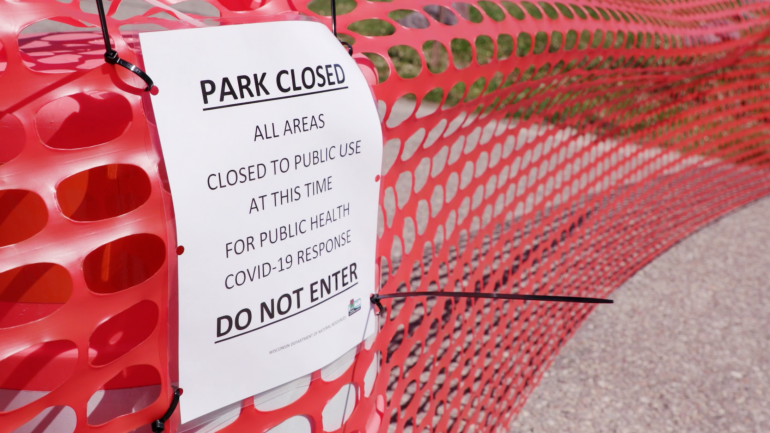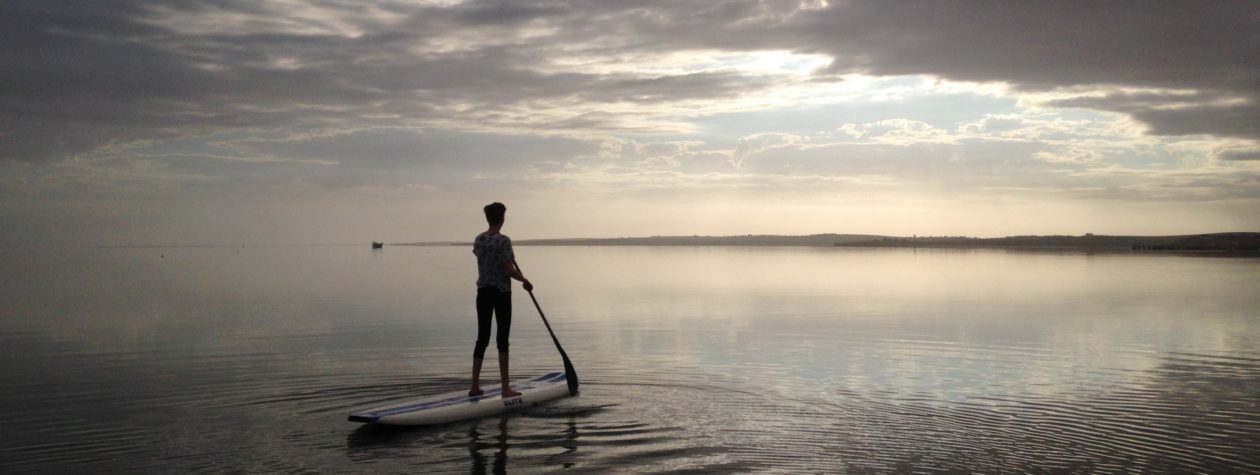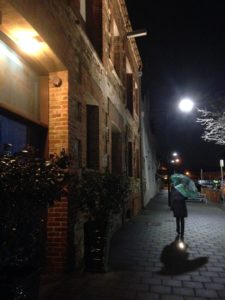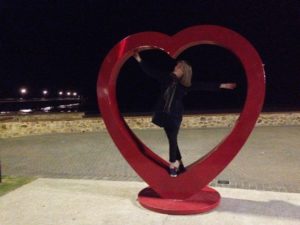
A short story by Kathryn McDonald.
The path up to the window seems longer these days. She is waiting in the alcove wearing the soft blue cardigan that he always loves to see her in and which she always insists is teal. In her lap is the small photo album he brought her on his last visit. It contains holiday snapshots, frozen moments encased in maroon leather. He longs to join her inside but that isn’t possible. The aged care home’s doors remain closed as the country counts the diagnosed cases and watches the spread of Covid-19 closely. It hurts to be outside while she remains inside, within reach but beyond touch. His palms rest on the cold window, willing it to disappear.
Happy to see him she sits straighter in her chair and she smiles. She doesn’t know why he doesn’t come in, but then he does love being outside. Just the other day he stopped his gardening to smile and wave through the kitchen window to show he was still there. Funny things windows; they open you up to the world while sealing you off from it. She absentmindedly flips through the album while she listens to his voice through the phones they both hold. Her eyes drop to a page of photos from their Paris holiday. She looks at the photo of their favourite boulangerie; the baguettes, the pastries, the rows of scrumptiousness in the window, the cobbled street to its door.
I feel the uneven street beneath my feet as I step from the shop. ‘Bye. Merci, bonnejournée.’ We laugh at our stumbling efforts to communicate in French. What must they think of our appalling accents? Our shopping has been successful in spite of the language barrier. We now have in our hands the makings of a picnic lunch. I check my much folded map for directions and we head off on foot in the direction of the Tuileries garden. He may complain about all the walking, but what better way is there to experience a place? As we stroll we point out landmarks and sights which seem particularly French, n’est-ce pas? The tall white buildings, filigree balconies decorated with plants and the occasional pet, and ancient churches tucked in between shops and cafes. Dodging the crowds of people, we weave through the streets, taking the time to soak up the atmosphere of Paris, the bustle, the history, the glamour, the constant activity, sirens and horns.

He has been observing her lost in her thoughts. She lives so much in the past now, what must she think to see this grey haired old man in front of her? He talks to her of this and that: the cat’s sudden aversion to the rocking chair on the porch, the way performances are being shown for free on YouTube because all the venues are closed, how he’s finally fixed the broken doorbell. Not that there’s much point when he can’t have visitors because of this virus.
‘Is it really bad, this … disease?’ she asks in a moment of increasingly rare lucidity. He’s told her all this before but he tells her again, frustrated but grateful for the interaction.
‘Yes, people die from it. It’s really contagious, that’s why I can’t come in.’
‘Why can’t I come out?’
‘It’s to keep you safe, to keep you from catching it and…,’ he stops. ‘Besides, everything is closed. Cafes, restaurants, even libraries and cinemas. There is nowhere to go.’ His own world has been reduced to this window, their home and the path in-between.
She gestures impatiently then lays her hands back down on her lap. He longs to hold them. His heart aches seeing those long slender fingers lying listlessly on the page. He pictures them tracing flight routes on the old globe. She was always planning their next holiday, talking animatedly about the places they might visit. Unconsciously he reaches out to her.
‘This growing old thing can be hard sometimes,’ he says to her sadly, ‘our adventures are …’ His voice falters. The temperature has dropped and the metallic smell of new rain fills his nostrils. It has started to drizzle, the light rain settling on his face and misting the window. He ignores it. He does not want to break this moment of mediated connection.

He remembers another time they were caught in the rain. They had been riding on the top deck of a cruise boat travelling down the Seine in the dusk as the skies had opened up. Refusing to go inside the cabin, they huddled closer to each other for the illusion of warmth and shelter. Shivering and laughing they had clinked their plastic glasses together as the lights on the Eiffel tower sparkled into life. The rain flowed down their faces and rain drops diluted their French champagne. He remembers feeling her joy when she started singing ‘I love Paris in the springtime’ at the top of her lungs. Overcome with love for her he had kissed her radiant damp face.
‘Can we just go across to the park?’ Her question calls him back to the present.
‘We can’t. Parks are closed too. Besides, it’s raining!’ The rain has become heavier. Raindrops are now splashing on the window ledge. His umbrella is up, shielding his phone, his only way of communicating with her for now.
She sighs. What nonsense, who would close a park?

I can’t believe how many people are in the Tuileries Garden. People are walking dogs in themed coats, some more expensive than mine! Men are playing boules, their outbursts of triumph or frustration peppering the air. Children are swinging on the swings or riding painted horses on the carousels that seem to be everywhere in Paris. Young, hopeful actors are rehearsing their lines dramatically between rows of trees. Busy people are using the park as a thoroughfare. Restful people are sitting in the strange green metal sloped chairs, their feet up on the concrete rim of the pond. Some reading, some talking, too many smoking. Statues adorned with pigeons are watching silently from the perimeter. Miraculously we find a pair of vacant chairs at the edge of the pond and settle down to eat our picnic. Do people really find these chairs comfortable? I assemble our baguettes, while he opens the little bottle of Beaujolais and pours it into two glasses. I bite into my baguette, wincing as the crusty bread scratches the inside of my mouth. But oh, the deliciousness of that combination of fresh bread, gruyere and ham in each bite.
We pore over the Louvre guide, preparing for our visit; deciding which artworks can’t be missed, which matter less. The Venus de Milo, the Winged Victory of Samothrace, the Mona Lisa of course, people say she’s tiny you know!
‘We have to have a plan,’ he declares. He doesn’t like to leave things to chance. ‘Did you know that it would take you a month nonstop to see every single piece of art at the Louvre?’ He is proud of his information. I laugh, impressed. He has done his research too.
A gust of wind blows the water across the pond and onto the guide, obscuring the words on the page like the rain on the window obscures his face on the other side as she looks up. Droplets of water meander down the window pane creating winding pathways like the crazy maps they’d forged on their activity trackers wandering the Parisian streets. She had always been the ‘keeper of the map’, endlessly amazing him with her ability to plan their route to incorporate the most obscure of sights. Surprising him with how easily she’d pick up the trail again after stopping for their lunch of soupe à l’oignon or croque monsieur. How she always kept her sense of direction while he was constantly topographically challenged. Being in the northern hemisphere seemed to have disrupted his internal compass somehow. Sadly, these days she can barely even pick up the trail of her thoughts. Now it is his turn to be her compass, to keep her from becoming lost. But with this damned glass between them…
‘The whole world is closed, even the Eiffel Tower and the Louvre,’ he continues. He’s sure she doesn’t really believe him. He shows her a picture of the empty steps at Montmartre on his phone through the window. He tells her that the streets here are generally quiet these days too as people stay in their homes. Except for the footpaths. The footpaths are now full of people walking their dogs, just like in Paris. He smiles wryly at the thought.
‘They say the curve is flattening at last, less than 100 new cases in Australia today. I might be able to come in soon.’ He has to believe that it will be soon. Oh God please let it be soon.
A carer comes to take her to lunch. Regretfully, he says goodbye, hand pressed to the wet glass. He touches his fingers to his lips in a salute of love,
‘Au revoir.’
‘A bientôt,’ she responds automatically, wistfully. The carer squeezes her shoulder comfortingly and she is wheeled away. He turns to leave and as he walks away his shoulders slump. His feet drag as heavily as his heart. The gloomy sky reflects his mood. ‘I’m losing her,’ his heart cries. The rain and tears run down his cheeks merging like memories as he heads toward a home that has never felt so empty. Like navigating the cobbled, upside down streets of Paris, this well-worn path now feels strangely unfamiliar. As he walks it alone his steps feel uncertain with his map keeper no longer by his side.




 g the sexism my daughters continue to face reinforces that part of my role as a feminist is as a parent preparing them to face that world and challenge those norms.
g the sexism my daughters continue to face reinforces that part of my role as a feminist is as a parent preparing them to face that world and challenge those norms.


